Gatekeepers: Meet the Women Behind Kentucky Basketball and Football

At the start of the summer, the leaders of the most powerful conference in college sports convened in a ballroom in Destin, Florida. A single room held the presidents, athletic directors, football coaches, basketball coaches, compliance officers, and sports information directors (SIDs) of all 14 institutions in the Southeastern Conference. On this day of the annual SEC Spring Meetings, Oris Stuart, the NBA’s Chief People and Inclusion Officer, was leading a workshop. After asking the group to share how their schools try to further their goals of inclusivity and diversity, he zeroed his focus in on one person: a short blonde woman wearing a bright blue dress at the front center table.
“I looked up and he’s staring right at me and I looked around and he just started grinning. And the whole audience laughed. He was like, ‘Mhmm. I’m looking at you! You caught my eye.'”
“Oh crap, I thought. I said, ‘Well, I’m Susan. I’m the football SID at Kentucky. I’m a woman. And when I first got asked to be the football SID, I was scared because I hadn’t played football and I thought, ‘Oh crap. No one’s gonna have faith in me because I’ve never played football.’
“But, you know what? It’s not about the stats; it’s about relationships. I’m a woman and I have a different relationship with the players than these men do. They come to me for everything. I’m like their mom. I’m like their best friend. They tell me everything. I can talk to them differently than the men can. I may not know what a pass break-up is sometimes but I know who their girlfriend is and if I don’t know something, I find someone who does and I figure it out because that’s what women do.'”
A chorus of cheers erupted from the back of the room. Lax turned her head to see the other women in the room on their feet whooping in solidarity. One small speech for woman, one giant rallying cry for women in sports-information kind.
For 25 years, Susan Lax — aka “Slax” — has served as an SID for Kentucky Football. For the past five years, she’s been the primary contact for the team, one of only 11 women in the Football Bowl Subdivision (FBS) to hold that title. A few doors down from her at the Joe Craft Center is Deb Moore, the SID for men’s basketball, one of only six women in the Power Five conferences in her role. Of the nearly 70 schools in the Power Five, only three have women serving as the primary communications contact in both football and men’s basketball: Kentucky, Auburn, and Missouri.
These women hold the keys to two of the most powerful programs in college sports, a job with too many roles and demands to properly define. For the love of the sport, the school, and the players they protect, Lax and Moore have sacrificed any semblance of a “normal” life. On the 50th anniversary of Title IX, it is only fitting to do for them what they do for others: share their story.
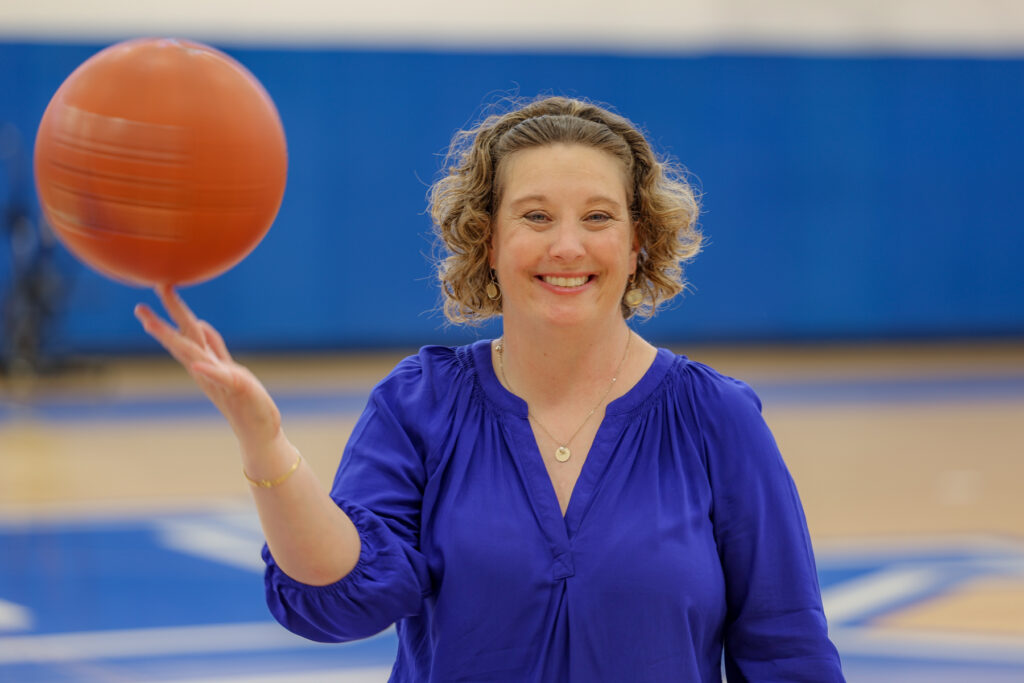
“If you have a problem with Deb, then you have a problem with me.”
It’s February, a critical juncture for Kentucky Basketball. The Cats were well into conference play, Oscar Tshiebwe’s national player of the year campaign was just getting started, and hopes were high for a special run in March. For the most experienced staff, that’s a busy time, but for UK Athletics, it was also a period of transition. Eric Lindsey, the men’s basketball SID, stepped down in early January. Moore, who had served as the secondary contact for men’s basketball for eight years, took over the role for the rest of the season; beyond that remained uncertain. Tony Neely, Kentucky’s Assistant AD for Athletics Communications and Public Relations, was mulling over how to proceed when Lance Ware stopped by his door while waiting to film his installment of the “This is Kentucky Basketball” social media series.
“It was the first time I had met Tony and he asked me how Deb was,” Ware told KSR. “I basically just told him that she was great, how good of a job she did, and how much I enjoyed being around her. And then I said, ‘If you have a problem with Deb then you have a problem with me.’ And we just started laughing. It was funny. I just explained to him how much I enjoyed her and how good she is at her job.”
Neely took Ware’s words to heart.
“That was something I loved to hear. Not that I didn’t suspect it but something that reaffirmed what I thought in terms of Deb’s relationship with the players. That was a significant moment for me in moving this thing to the finish line and putting Deb in that spot.”
Moore has been a sports fan since birth. A Redskins fan growing up, she dreamed of playing football. That was out of the question, as was basketball once her growth spurt stopped around five feet. So, Moore eventually gave up playing sports to do the next best thing: write about them. She went to St. Bonaventure to pursue a degree in journalism and mass communications. Determined to make the students-only radio broadcast of the women’s basketball games, she kept her own stats in the stands. When the St. Bonaventure SID noticed what she was doing, he sent someone to recruit her.
After a month in the sports information office, Moore had found her path. She accepted a job at Indiana in the spring of her senior year but gave it up when Kentucky came calling. In 2007, her second year in Lexington, Moore interned with the Kentucky Football team under Neely and Slax, getting a front-row seat to memories like the win over No. 1 LSU and “Stevie Got Loose” vs. Louisville. She earned a full-time position soon after and began working with softball and volleyball, overseeing the rise of Rachel Lawson and Craig Skinner’s programs. In 2014, she shifted most of her focus to men’s basketball, just in time for a “great story.”
“Knocking off all these little milestones along the way and watching these mountains be climbed has been so inspiring,” Moore recalled of her time with softball and volleyball. “My first year really being fully invested in basketball and not splitting a lot of time, really traveling was 2014 when Aaron [Harrison] hit all those shots and we made that crazy run. And the next year, we go 38-0 and I’m like, ‘Holy man, this is the coolest thing ever.'”
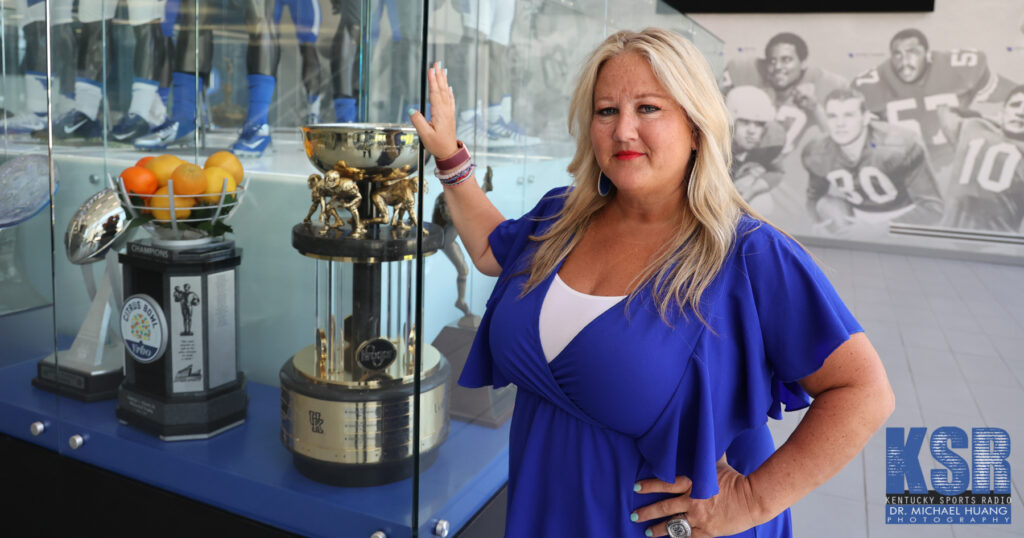
Unlike Moore, Lax has mostly worked with the same sport since arriving at Kentucky 25 years ago: football. A tennis player at Freed-Hardeman University in Tennessee, she developed a love for sports information and returned to her native Murray, Kentucky to pursue a graduate degree at Murray State. At the time, Mark Gottfried was the Racers’ basketball coach and Houston Nutt the football coach. Lax applied for a job at the Southeastern Conference upon graduation but was denied. As luck would have it, Kentucky had a job opening and called the SEC to see if they knew of any potential candidates. When they heard a girl from Murray was available, they came calling.
“My interview was at the UofL football game in 1997. At halftime, I met with [former Kentucky Athletics Directors] Larry Ivy and CM Newton. I was like, what is happening?” Lax said. “I’m at this game. It’s Louisville. Tim Couch is throwing all over the place. It was surreal.”
Lax was driving home to Murray on the Bluegrass Parkway when the news that Princess Diana died broke. An already memorable day was now cemented in history. Two weeks later, she moved to Lexington to start her new role as the secondary contact in football and the primary in women’s basketball.
“She got thrown into the fire,” Neely said. “We all did. 1997 was the season Tim Couch got the starting quarterback job. Obviously, it was a great thing. We had national media attention all the time for a few years.”
Couch and first-year head coach Hal Mumme put Kentucky Football on the map in 1997. In 1998, the media attention intensified as Couch became an All-American, Heisman finalist, and eventually the No. 1 draft pick. Even though she was learning on the fly, Couch could tell Slax was a natural as she helped guide him through the circus.
“Susan is one of those people when you first meet her, you feel like you’ve known her forever,” Couch said. “She’s just so outgoing and personable and funny and quick-witted and has great stories and is so intelligent that you just feel like you know her and can trust her right away. I think that’s the way she was when she first came to Kentucky. She just walked right in and was very confident in what she was doing and never batted an eye. Being around a bunch of big football players, this little woman walking in there, she was not intimidated whatsoever and I think everyone just respects her.”
In those early days, Slax quickly learned how spontaneous her new job could be. Sports Illustrated came to town for a photoshoot with Couch at Commonwealth Stadium (now Kroger Field). It was a big production, with lighting crews, makeup and wardrobe people, etc. For hours, Couch worked with the photographers in the heat to get the perfect shot.
“Tim was one of those guys who would sit and endure everything. He would do anything we asked of him. He would stand by horses. He would just do anything. All day, doing these shots.”
“Then the sprinkler system came on in Kroger Field and he just went out there and stood out there like this,” Slax said, thrusting her arms out and looking to the sky. “We were out there all day and then the sprinkler came on and he went like this and that’s the shot they used. All this work and that’s the spontaneous thing that happened.”
“I had forgotten all about that,” Couch said. “I remember it now that you say it but that was pretty cool. It took all day to get that shot and it happened by accident.”
Couch went on to be the No. 1 pick in the 1999 NFL Draft. He spent five years as the starting quarterback for the Cleveland Browns but injuries cut his time in the pros short. After retiring from the game, he went into broadcasting and now lives in Lexington. Slax jokes that she’s still his SID because she gets interview requests for him from time to time, especially now that another Kentucky quarterback, Will Levis, is garnering plenty of media attention.
“I would say trustworthy,” Couch said of Slax’s defining trait. “I think that’s the biggest thing I got working with Susan. It can be overwhelming for an athlete. The number of media requests and demands on your time can get overwhelming every now and then. She’s just someone you can always trust and say, ‘Hey, I’m just burnt out. I don’t want to do any interviews today’ or ‘I only want to do this one,’ and I could always trust her to pick and choose the right ones for me that I really needed to sit down with and do the interview with.”
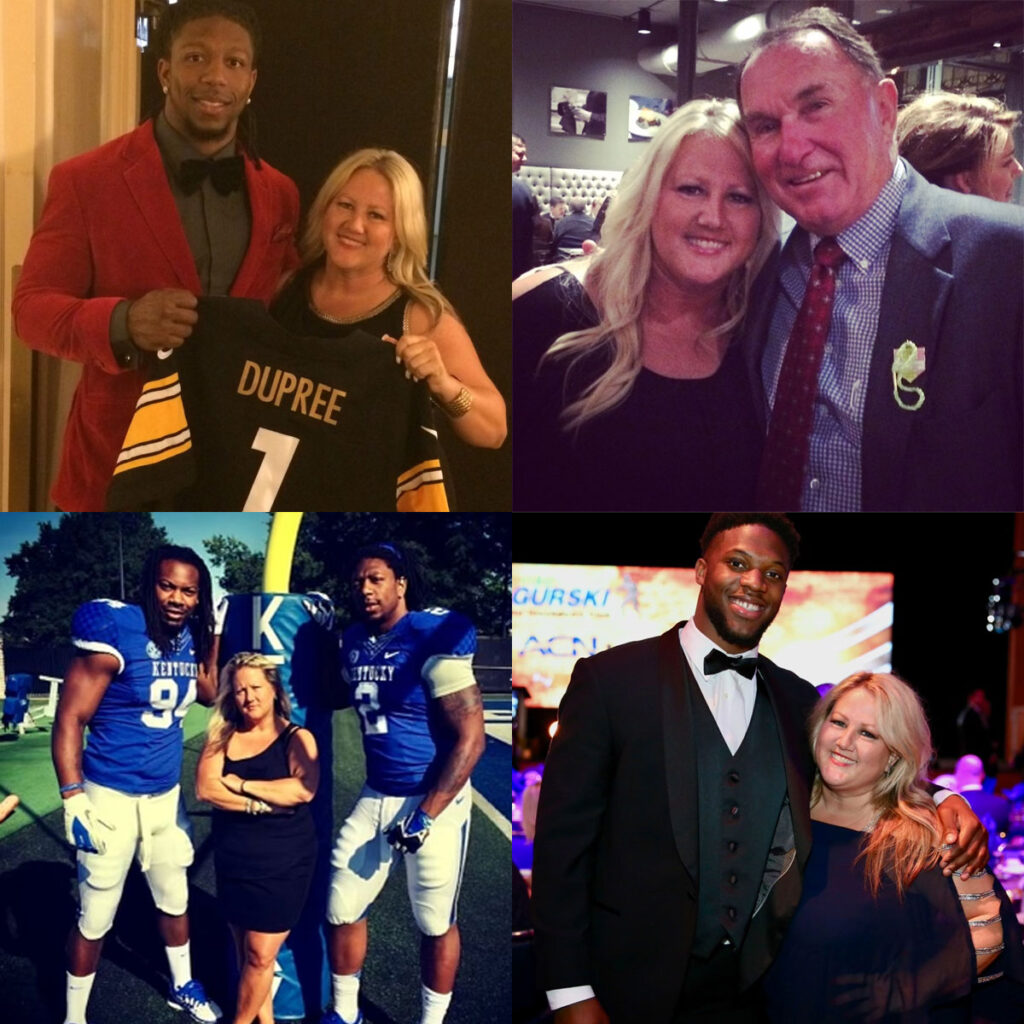
Twenty-five years later, it is Levis that leans on Slax as he navigates the noise of being a projected top-ten draft pick and everything that comes with it.
“My relationship with Slax is annoying because she always asks me to do stuff for her and I don’t like it,” he joked. “No, she is absolutely incredible to work with. Obviously, if you meet her, she’s the nicest lady ever and just a great person to talk to and hang out with but I know that what she does and the job that she has is not always the easiest, dealing with college athletes and how crazy our schedules can be and her schedule can be to try to find time to cooperate and do the things that we need to do from a media standpoint.”
“For Slax to be so understanding with how she approaches the conversations and letting us know and keeping us updated with what we’re being sought for, she does it better than anyone else in the country.”
“The idea that these kids don’t care is the craziest thing I’ve ever heard.”
Slax’s and Moore’s jobs are similar in many ways. In addition to setting up press conferences and interviews and preparing players to face the media, they put together stats, game notes, and press releases, tedious tasks that require long hours at the keyboard. There are also long hours away from the keyboard as they travel with the team to games. Always on call, their phones are never off or in “Do not disturb” mode. Social media turned an already busy job into one that never stops.
Yet, in other ways, their jobs are as different as the sports themselves. Slax deals with over 100 players every year, whereas Moore manages 15; football players sometimes have years before their “breakout” moment, but the demand on Kentucky Basketball players is immediate. Even before they step on campus, they’ve been in the spotlight as elite recruits, so Moore has to quickly establish trust to guide them through the process. Add in the program’s high expectations and one of the most rabid fanbases in all of sports and that’s a lot, especially for 17 or 18-year-old kids. As John Calipari often says, this isn’t for everyone.
“You do want to protect them at times because this can be really tough,” Moore said. “It’s a tough time in their life transitioning from being at home. I can’t imagine the pressure they feel and the constant eyes are always on you. You can’t mess up. As passionate as our fans can be, there’s some negativity to that too. I just want to hug them and let them know it’s going to be okay. You’re going to be alright.”
If you’ve seen a player after the game, you’ve seen Moore. She’s a constant fixture by their sides, leading them to radio or TV interviews and press conferences or rescuing them from situations when she can tell they’ve had enough. That’s a challenge for which Moore is uniquely qualified. She was born with a hearing impairment. She wears hearing aids above both ears, but throughout her life, has learned how to read body language, eyes, and social cues to help her fill in blanks if she misses something. This helps her read players and figure out what they need.
“Seeing the way adults react to them and act like they’re this superstar, it’s overwhelming for them at times. Sometimes I think people think I’m this mean person that’s rushing them out of there but I can sense when they’re starting to get uncomfortable or when it’s too much, to move them out of there.”
Try as she might, there are times Moore can’t protect the players. Losses are tough, but even more so in the social media age. For every word of encouragement or support, there is a chorus of negativity within a fingertip’s reach. The thought haunts Moore after each defeat.
“Losses are really, really hard, and again, it’s not because it’s personally killing me because I couldn’t change it but watching the devastation in the players’ eyes? They put their whole hearts and souls into it. The idea that these kids don’t care is the craziest thing I’ve ever heard. Anybody accuses these kids can — I wish we could take people in the locker rooms more often because even regular-season losses hurt them more than people think. This is their whole being. They love it here.”
That’s just one reason Moore’s role is so important. One of John Calipari’s tenets when it comes to Kentucky Basketball communications is allowing fans to know the players “beyond the white lines.”
“They all have families and backgrounds that shaped who they are. They all have interests or passions. How do we bring that out of them so then you connect to and maybe you’re not so quick to say, ‘Well he missed six threes last night. He’s a terrible human being.’ No, he’s not a terrible human being, he had an off night. It happens to everybody. And remember that they’re kids.”
“The role Deb is stepping into is not an easy one,” John Calipari said in a statement to KSR. “It’s not just what the media sees – setting up interviews and scheduling press conferences. The nature of this program demands that the person responsible for managing our communications and PR have a pulse on Big Blue Nation and that they actively share the story of Kentucky Basketball in a way that doesn’t allow others to write a false narrative about us. It requires a lot of creativity and a lot of passion and you have to be a champion for our basketball program 24 hours a day, seven days a week. I’m excited to see Deb embrace those challenges.”
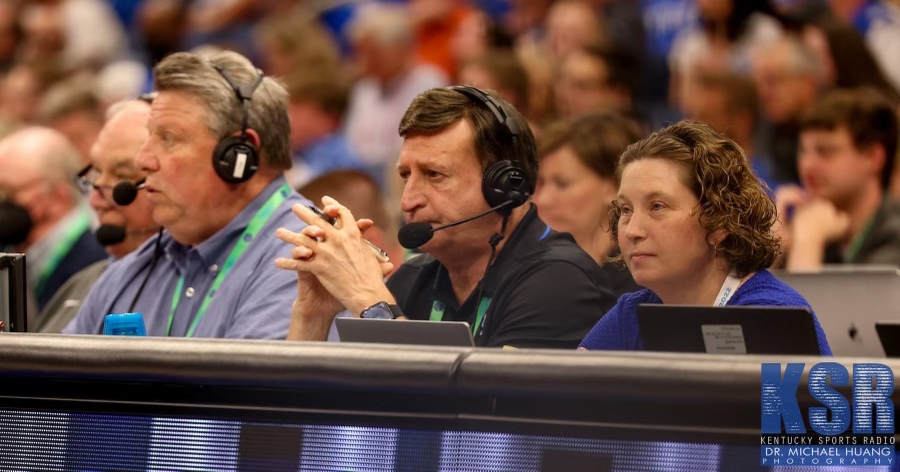
“I definitely feel an advantage by being a woman”
Being a woman in a male-dominated industry like sports isn’t easy. Moore and Slax are used to being the only woman in the room and not being taken seriously because of their gender; that said, both believe being a woman actually makes their jobs easier in some ways.
“I definitely feel an advantage by being a woman,” Moore said. “I’m not threatening. I’m not going to make them run suicides, those kinds of things. They’ve all had moms and grandmas who have loved on them so it’s almost like an instant caring, nurturing aura about us that draws them in.”
“We bring something different to the table,” Slax agreed. “Relationships and organization. It’s just the way it is. No knock. It’s just the way it is. Organization, nurturing, and relationships.”
Mom, mentor, media coach, and therapist are just a few of the hats Slax and Moore wear. They use all those skills when getting to know the players each year to then share their stories with fans and the media, a process that varies with each individual.
“You’re constantly trying to find a connection,” Moore said. “What’s important to them besides basketball? That’s usually the route I go. They’ve got enough people talking to them about basketball so I do everything I can to not talk about basketball. I ask how classes are, are you excited to see mom? Mom is usually a really good place to start.”
Moore’s mother was a middle school teacher. Being a part of such a critical juncture of a kid’s life — even with its attitudes and hormones — really appealed to her. The same goes for Moore as she guides her players through a different transition.
“There’s something about this for me that I love this period in their lives where they’re learning to trust and learning to develop and learning to grow. And then going and pursuing something faster than most everybody else. Being an adult a lot quicker. I just want them to understand that there are people here that are helping them in every avenue of it. They’re not going to be great at everything. They’re not going to be great on the court at every little thing and you’re not necessarily going to be great at media either but we try to teach them.”
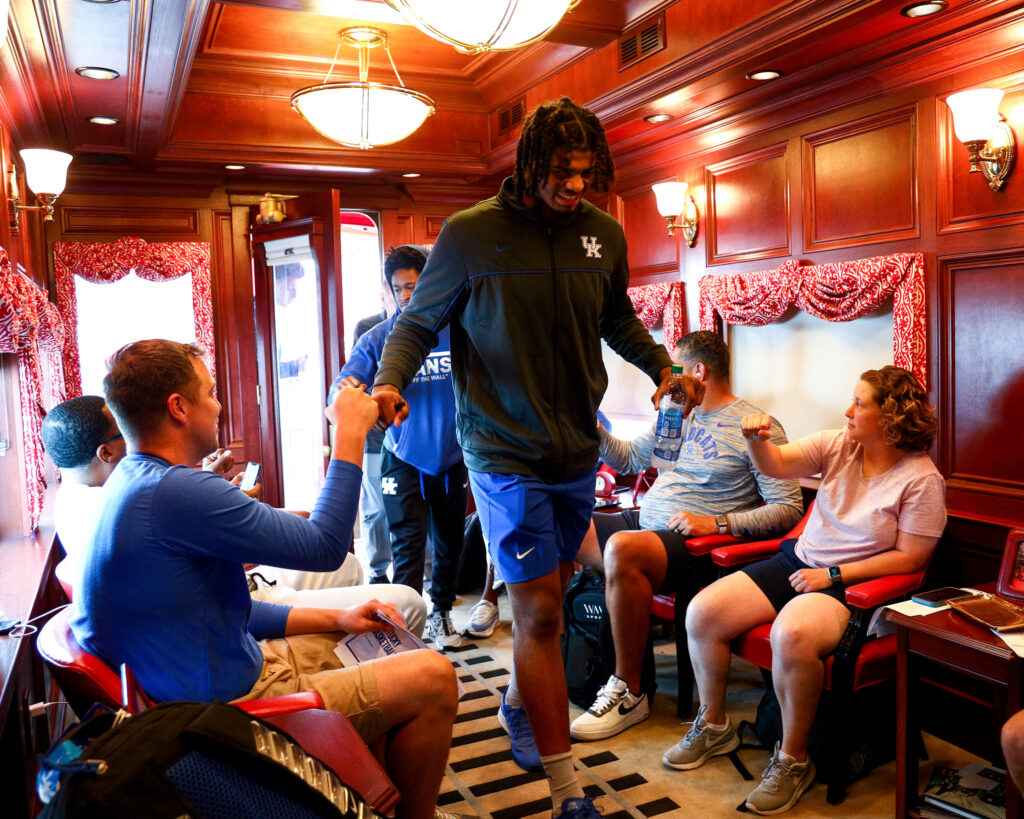
Kentucky Basketball brings in specialists for social media training, but Moore [and Lindsey, during his tenure] really focus on giving players the tools they need to best express themselves, whether it’s in a press conference, a class presentation, or an interview with an NBA general manager.
“We never want to teach them not to say things,” Moore said. “We want them to be able to express answers and be able to drive an interview, we want them to be in control as much as they can versus feeling attacked.”
Immanuel Quickley was Moore’s first example of a player coming out of their shell. By the end of his sophomore season, Quickley was a fan favorite, sharing stories about his drumming, his family, and his faith.
“Sure, his confidence soared on the court when he was playing well but he was a pretty quiet guy and kind of in the shadows his freshman year. I felt like he busted out in the media with confidence before he even busted out on the floor.”
Moore will never forget PJ Washington’s father talking about how his son transformed on the court and with the media at Kentucky (“You like those little wins.”), nor the moment Alex Poythress sat down with a reporter before Senior Day and talked about his mother’s Stage 5 kidney failure.
“He’s a guy who carried some weight on his shoulders the entire time he was here and he was a very insightful and thoughtful guy but didn’t like to say a whole lot. When he finally opened up that was really special because I think it allowed folks to really have a sense of, a reminder that we really don’t know what’s going on in these kids’ lives every day unless it’s public.”
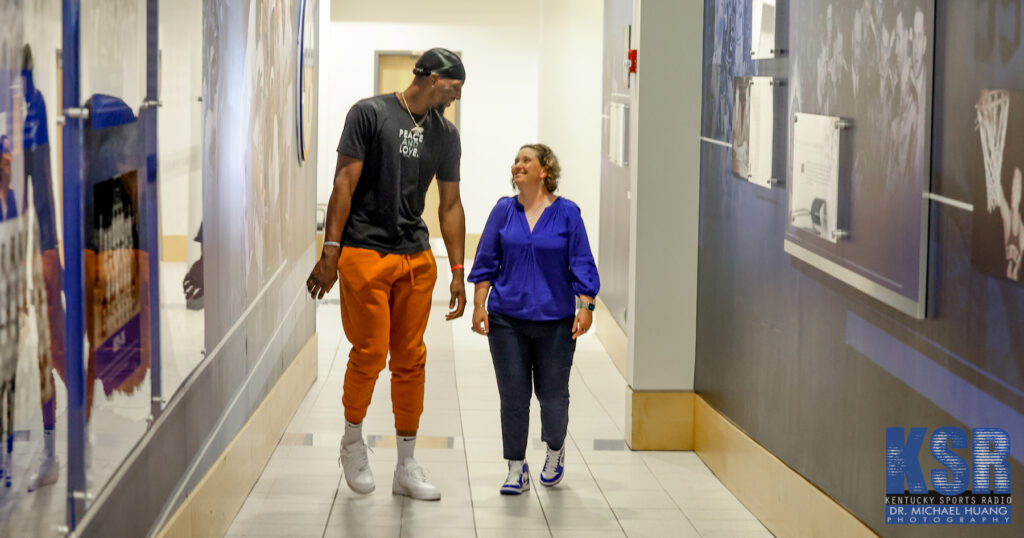
Bam Adebayo on Moore: “She’s kind of like the backbone”
One of Kentucky Basketball’s biggest mama’s boys was actually walking the halls at the Joe Craft Center the day I was in town. When Moore spotted Bam Adebayo in TJ Beisner’s office, her face broke out into a grin.
“She’s kind of like the backbone when it comes to guys learning how to use social media and responsibilities,” the 2017 first-round draft pick and NBA All-Star said. “I feel like Deb is one of those people that takes it to the next level to make sure you do everything clean-cut, no accidents, no mishaps. That’s why a lot of the dudes that you see in the NBA now [messing up], it’s none of the Kentucky guys — knock on wood. That’s because Deb and the staff did a great job preparing us for the moment and our further endeavors in the NBA, whatever that may be.”
It’s been five years since Adebayo left for the NBA. He and Moore still text each other once or twice a month to check in. Moore still texts with Bam’s mother, Marilyn Blount, as well.
“She’s part of the family,” Adebayo said of Moore. “It’s good to still come back and see some familiar faces. See some people that you’ve been through a lot with through the year that I had and the heartbreaks of the season. It’s one of those things that you invest that much time and effort into so to still have somebody when I come back, we can still talk about when I was in college and having to go to class and her peeking her head in and seeing who was in class. Those are the memories that feel like last a lifetime.”
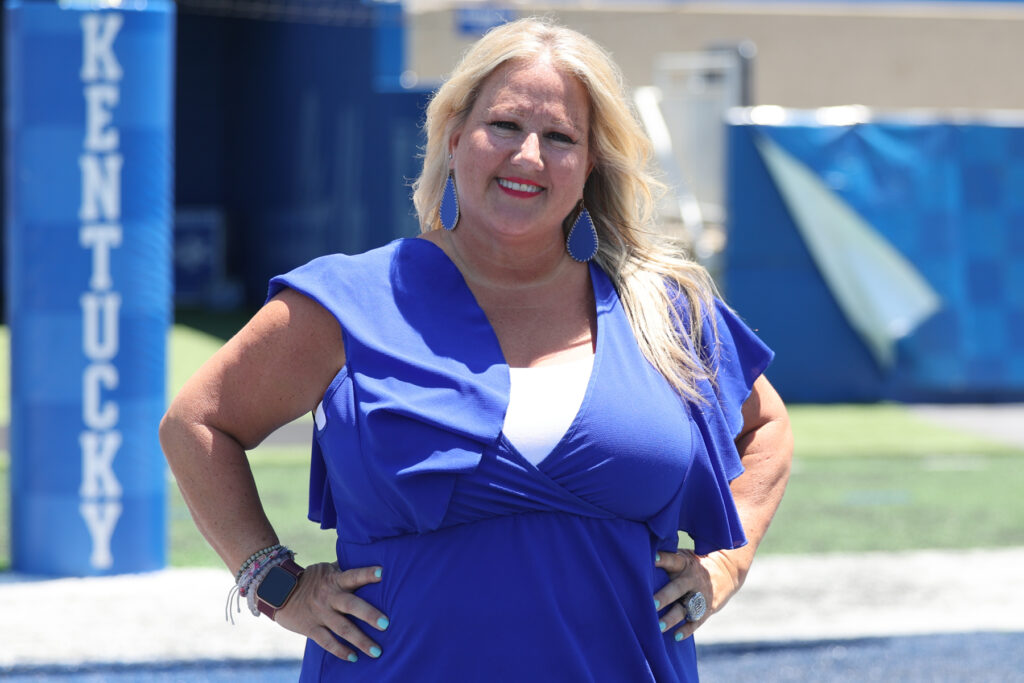
“If Oprah were to come to your house with a camera, what would your story be?”
With over 100 guys on the team each year, Slax’s process is a little more complex. She starts by meeting each newcomer and exchanging phone numbers. “Headshot Day” is big. Slax helps the players put their ties on and usually gets them to laugh before their picture is taken for their website bio. From there, she sends them a questionnaire in hopes of unearthing glimpses into their personalities. Then, she makes the rounds at breakfast and lunch, chatting and prodding.
“Who’s your mentor? Why do you play football? If Oprah were to come to your house with a camera, what would your story be? Dive in. Tell me. I make them tell me.”
Those sessions around the cafeteria table are big. That’s where Slax found out that Courtney Love’s father served time in prison while he was growing up, which led to his work with Amachi, a local organization that pairs mentors with children who are affected by incarceration. It’s also where Landon Foster told her about Dejene, a 14-year-old orphan he met on a service trip to Ethiopia. Foster was so touched by Dejene’s story he sponsored him to make sure he had food and helped him move to America to live with a foster family.
“That’s the thing when I look back, that’s my gift. I can reach in and find these stories and it’s so crazy.”
Sometimes players are hesitant to share their stories, like junior outside linebacker JJ Weaver, who was born with an extra finger on his right hand.
“He wouldn’t let me tell the six fingers story,” Slax said of Weaver. “I was like, we’ve got to keep pushing. We have to do the six [finger story]. You don’t understand. You’re going to help people. You’re going to help people!”
Turns out he did. A teacher emailed Slax and said she has also six fingers on one hand, as do two kids in her class.
“I started crying and said, ‘JJ, do you even understand what you’re doing?’ And then he started crying and it’s on [College] Gameday and now he’s got a brand called Perfect Fit and he’s got gloves. It’s just like, dude, it’s so cool. If you just let me sit down and let me hear your story, I’m going to pull something out of you. Everyone has a story. Every single person.”
Senior offensive guard Kenneth Horsey is also using his story for good. Before his freshman season, he was diagnosed with endocarditis, a dangerous infection on a heart valve, and had to undergo open-heart surgery. After making a full recovery, Horsey became a starter on Kentucky’s Big Blue Wall and began partnering with the American Heart Association to teach Hands-On CPR. For his work, he was named a Mayo Comeback Player of the Year, and attended the awards ceremony in Houston. Several other college coaches were in attendance and upon hearing Horsey’s story, vowed to implement Hands-On CPR training with their teams.
“It’s a ripple effect,” Slax said. “We’re not just doing it to put on Twitter and show, look what we’re doing. It’s saving people’s lives.”
And then there are the stories that are hard to tell because they break your heart. In 2018, Josh Paschal was diagnosed with a malignant melanoma on the bottom of his foot ahead of his sophomore year at Kentucky. By now, you know he beat cancer and became an NFL Draft pick, but it was a long and emotional journey for everyone involved. Sharing a story like Paschal’s is extremely delicate. When I asked Slax about it, she immediately teared up because the day before, she had texted him to ask for a favor for a former player whose child had just been diagnosed with cancer.
“You know what he did? He stopped everything and he sent me a video for the kid. That’s Josh.”
Getting to that point wasn’t easy. In 2019, Paschal won the Heart of a Wildcat Award at the CATSPYs, UK Athletics’ annual end-of-year celebration. Slax told Paschal ahead of time that he’d won so they could prepare an acceptance speech. He had chemotherapy the day of the show. Drained from the treatment, Paschal told her he didn’t feel well enough to go. UK had pulled out all the stops, flying in ESPN’s Holly Rowe to present the award. With that in mind, Slax and Paschal compromised, agreeing to let Rowe read Josh’s acceptance speech for him.
Slax said that once Paschal saw she had his back and how much his story impacted others, he began to open up more and more.
“He started seeing all these people he was helping and he wanted to talk about it more and more. That’s the thing. They all see that their platform helps people.”
Paschal, Horsey, and Weaver all won the Mayo Comeback Player of the Year Award, which Mark Stoops says is a testament to their stories and Slax’s ability to get them to share them. In 2020, the Football Writers Association of America named Kentucky’s athletics communications/public relations office for football one of the 11 recipients of the Super 11 Awards, which honor departments and individuals who stand out in their performances.
“That takes a lot of work just gathering all that information, putting it together, having it available for people,” Stoops said. “We’ve won countless awards since I’ve been here and she has a lot to do with that and putting it together and gathering all that information and streaming it to the people that need it and getting it in front of people. Again, that takes the right work ethic to do it and that’s proof of what she’s doing right there in the awards that she’s received.”
One project close to Slax’s heart is the Chris Oats Foundation. Oats suffered a stroke in May 2020 after his sophomore year of college. After starting for Kentucky as a linebacker in the 2019 season, Oats was left wheelchair-bound by the medical episode. Keaton Upshaw, one of his teammates, started a GoFundMe that has raised over $180,000 for Oats’ rehabilitation. He recently finished a three-month stay at a Florida rehab facility and is learning how to walk again. Inspired by his story and the support from his mother, Kemberly, and siblings Ke’airra and Kelan, Slax started the Chris Oats Foundation to serve and support single-parent families experiencing the strain of caring for impaired children, specifically stroke victims.
“I feel like I’m making an impact,” she said. “My work with Chris Oats’ Foundation is making an impact.”
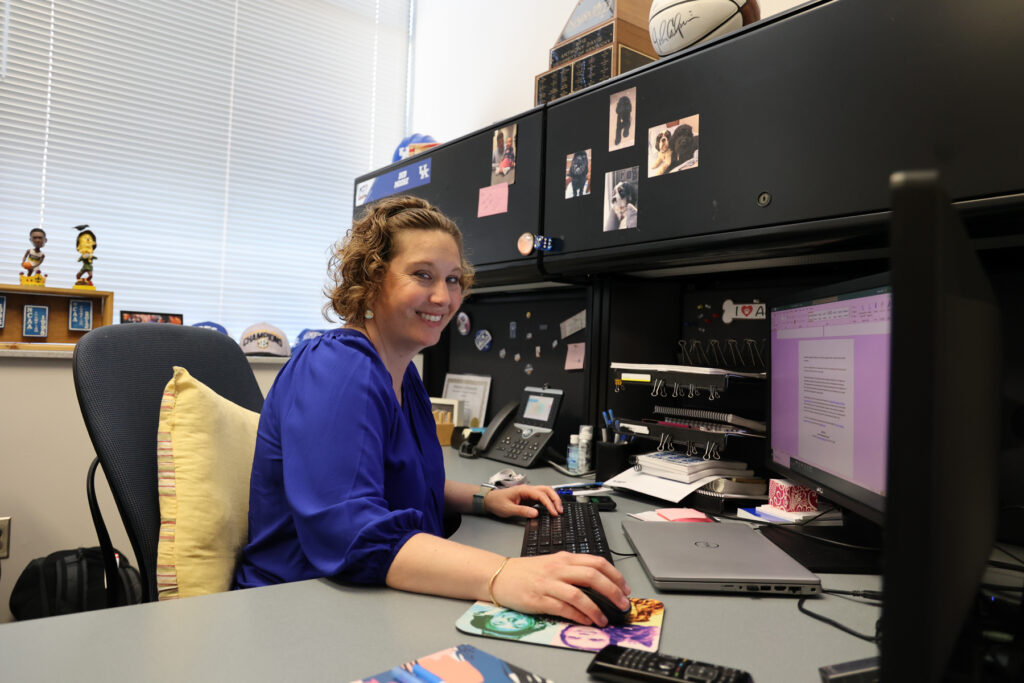
“Deb really comes along and helps you find that whole person.”
Now that she’s stepped into the primary role as men’s basketball SID, Moore is excited to fully immerse herself with the team to learn their stories. As the secondary contact, other duties prevented her from giving the players her full attention. That said, she’s responsible for many projects you’ll remember. In November when Oscar Tshiebwe started putting up crazy numbers, the UK Athletics staff decided to spoof ESPN’s “This Is SportsCenter” commercials from the 1990s. Everyone wanted to do something with Oscar’s quote about not being a machine (there was talk about remaking Albert Pujols’ “I’m not a machine, I’m Albert” SportsCenter spot), but Moore wanted to go in a different direction.
“This is Kentucky Basketball, particularly Oscar’s, came to me in the middle of the night, like at midnight, and it was kind of like — I just wanted to make a joke about the play on words of cleaning the glass. It literally just came to me one night.”
Like most things, Oscar made the video shoot look easy.
“Oscar brought so much to it. We were just walking down the hall after he put the uniform on and I said ‘Oscar, can you whistle?’ And he started doing the whistling and I said, ‘Yup, we’re going to do that.’ And he was the one who talked. There was no coaching to it at all.”
When Isaac Humphries came to Kentucky in 2015, he immediately felt at ease around Moore.
“She was super welcoming and it felt very homey when I arrived,” the Australian native recalled. “She takes a lot of us under her wing and she knows that we’re young. I think with me, she just took me under her wing and provided some comfort and safety as the media was starting to go a bit wild.”
“Deb sees more in us than just a basketball player,” he added. “She would always try to find the less obvious approach or the less obvious direction we could go in because it’s more interesting and we are whole people and we were young and we just needed to find that whole person. Deb really comes along and helps you find that whole person.”
When Moore found out that Humphries likes to sing, her mind went to work. She pitched the idea of a mini-concert in the Rupp Arena locker room to Humphries and Shannon Spake, who routinely covered the team for ESPN at the time.
Top 10
- 1
SEC
Makes NCAA Tournament history
- 2
Charles Barkley pokes UF
"I don't think the best team won"
- 3New
Duke odds
Title favorite makes move
- 4
Florida odds
Gators make big move with win
- 5
Alabama assistant
Hired as Arkansas State head coach
Get the On3 Top 10 to your inbox every morning
By clicking "Subscribe to Newsletter", I agree to On3's Privacy Notice, Terms, and use of my personal information described therein.
“That was the first time we did anything public and I remember Deb coming to me with that idea and I think I was hesitant and she talked me into it being a really positive idea and sharing new things and something people would love to see and sure enough, I filmed that and it was an incredible experience. We pulled a piano into the locker room at Rupp and I think that was the first time we all sort of heard me sing and Shannon, Deb, everyone was like, ‘What in the world is going on here. He’s actually really good.’ And it just went from there.”
“From there” included a special concert for charity, which Humphries wanted to do while he was in school but couldn’t because Name, Image, and Likeness (NIL) rights didn’t exist for college athletes at the time. A few years later, while playing professionally in the G-League, Humphries circled back to the idea.
“I remember texting her being like, ‘Do you remember the idea that I had? It’s time to kind of do that.’ And she said, ‘Yeah, it is.'”
In the summer of 2019, Humphries, Moore, and UK Athletics’ Nathan Schwake organized the concert at the Lexington Opera House, with proceeds going to the Ronald McDonald House. When Isaac walked off the stage, Moore was waiting in the wings.
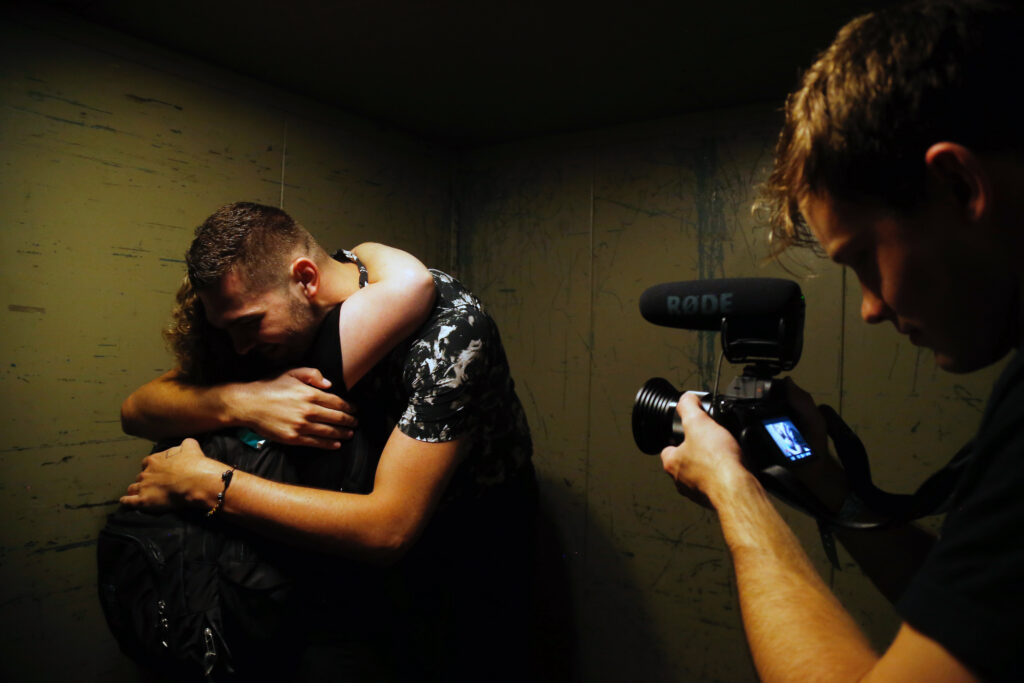
“It was a ‘We did it’ moment,” Moore recalled. “‘I got to live a dream of mine and I got to do it with you!'”
During the pandemic, Humphries hosted a virtual concert live from Australia, again in partnership with the Ronald McDonald House. Moore helped him out with that as well.
“We created these really special moments and it has nothing to do with basketball,” Humphries said. “That’s the craziest part. We met through basketball but our relationship and friendship took a whole different spin. We almost moved into more of a family sort of relationship and I value that so much.”
The picture of Moore and Humphries after the concert is one of many in her office. Player awards, bobbleheads, pictures, and souvenirs from Kentucky’s tournament runs cover every surface. Each item has a story to go with it. Next to her door is a collage of post-it notes and pictures of Karl-Anthony Towns. Towns had a habit of leaving notes for Moore in her office, and before he left town to prepare for the NBA Draft, stuffed a bunch under her door. The two still text regularly as well.
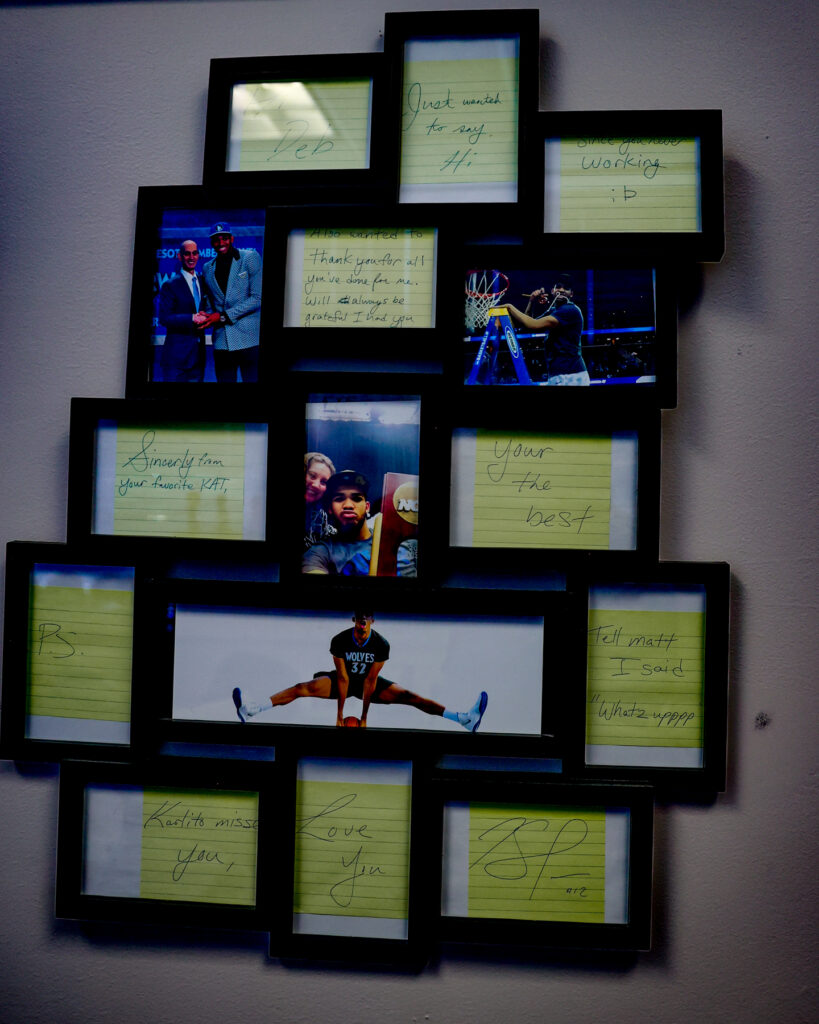
“Little things or big things, she’s there for them”
It’s early July, which means SEC Media Days is right around the corner. Next week, Kentucky will head to Atlanta for the annual event, the kickoff to college football’s “talking season.” Levis, Horsey, and linebacker DeAndre Square will make the rounds to speak with hundreds of media members, a crash course in the lessons Slax has taught them. Each year, she takes the SEC Media Days attendees to Dillard’s at Fayette Mall to pick out their suits. Coincidentally, I was on the phone with Mark Stoops when he spotted Slax in the Fayette Mall parking lot as she headed in for a meeting with the tailor. Several honks and a sarcastic “I gotta tell lies about you” later, he refocused his attention on our conversation.
“It’s just things that she does to go the extra mile,” Stoops said. “It’s just like right now, I’m here to get my son something for his birthday and she’s coming in here to help the guys pick out their suits for SEC Media Days. She’s there for them. Little things or big things, she’s there for them and I think that takes a person that is willing to give up their time and that says a lot about her because there are many other things she could be doing but I think she works around the clock for these young men.”
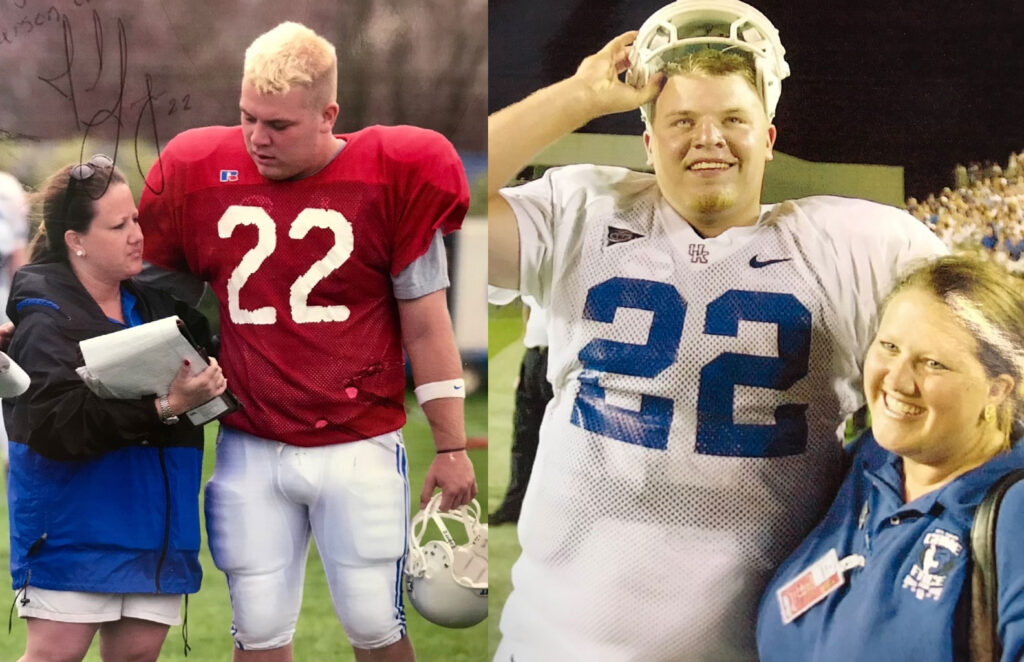
Of the countless stories Slax can tell about her time at Kentucky, many involve SEC Media Days. In 2017, Mike Edwards ripped his pants before boarding the plane to Hoover. He sheepishly told Slax and she went into action. She attempted to mend the pants herself on the plane but they were far from TV ready. Kentucky’s first stop in Alabama was a lunch with the Birmingham UK Alumni Association. Slax knew one of the members, the late Lee Stewart, aka “Not Jerry Tipton,” and called him for help. He told her about a seamstress near the Wynfrey Hotel in Hoover. The bus rolled up to the shop, the handoff was made, and Edwards attended the alumni group luncheon in UK shorts, his coat, dress, shirt, and tie. By the time the media rounds began, the pants were fixed and he had quite a story to share.
Darian Kinnard also ripped his pants at SEC Media Days, but just the pockets. Slax traveled with Josh Allen on his lengthy awards tour back in 2018, spending so much time with him that both admitted at one point they got on each other’s nerves. In March, she attended the Walter Camp Awards dinner with Will Levis when he accepted the 2021 Connecticut Player of Year award. Potentially the first of many such trips they’ll take, Levis cherished it.
“For her to come there and for all of us to kind of get dressed up and have a good night and to meet cool people together, that was a really cool experience for both of us and a special experience I had with her,” Levis said.
Slax recalled that Levis was studying for a test while on the trip and, like many of her players, kept asking about food.
“They’re just hungry all the time. They’re just hungry. That’s all they think about is, ‘When are we going to eat’ and ‘I’m so hungry.’ That’s all I’m doing is getting them food and thinking about their food. How can I arrange food for them at all times? Before media, after media, during training. ‘Is there going to be food there? Are we going to have food?’ Everything’s about food. I think about that all the time.”
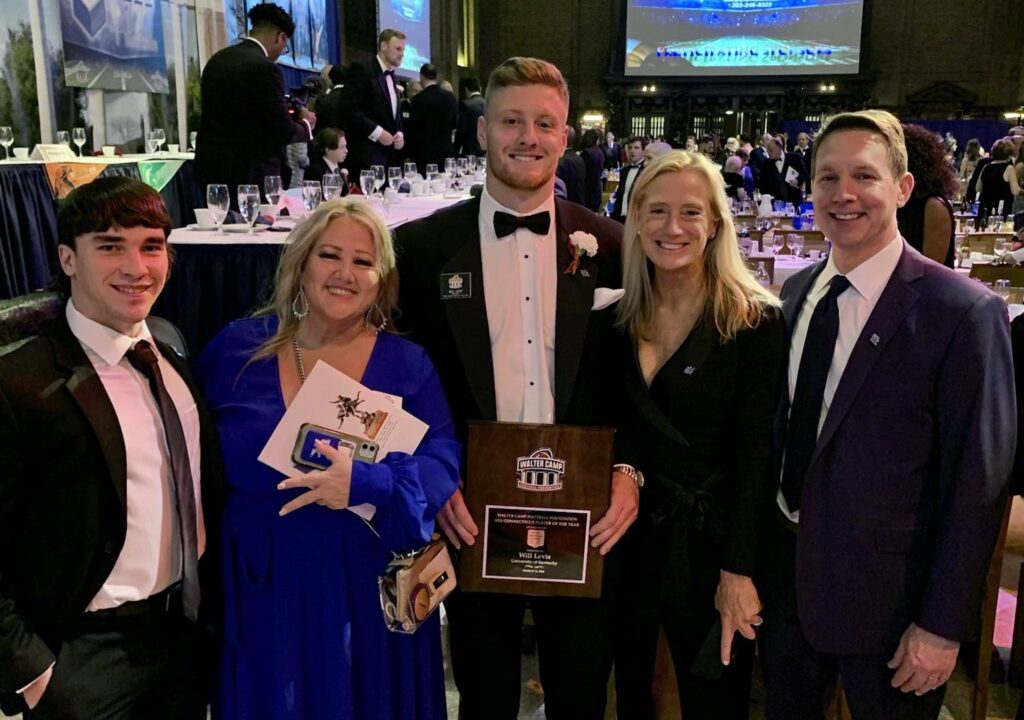
“That’s how we get an understanding of what makes a program tick”
Dealing with players and coaches is just a fraction of what Slax and Moore do on a daily basis. They’re also responsible for their programs’ communications, aka media. For the local beat, that means arranging press conferences and fielding interview requests. When the big TV guys come to town, it means packaging the current state of the program in a nutshell for them to build a production around, no easy feat.
“From a national television perspective, when we just parachute in for a weekend, helping us understand what is going on with the program in a way that we can share it is invaluable,” ESPN play-by-play commentator Tom Hart said. “Slax has her — probably suede — boots on the ground. That’s how we get an understanding of what makes the program tick. What makes a program tick? You can just ask Slax because she knows.”
When it comes to basketball, Hart appreciates how Deb helps him get to know the new guys — a common practice in the one-and-done era.
“What I really appreciate about Deb is, I can go to a basketball practice and sit next to her and whether it’s my first time seeing the team — which, as we know with a revolving roster that’s often — or my 30th time seeing the team, we can talk about players and trends and Kentucky Basketball history or we can just talk hoops. She’s not just a Kentucky Basketball expert, she’s a basketball expert.
“I can sit next to her in practice and get a feel for players and who they are and what they can do on the floor and oftentimes, it will be in relation to a previous Kentucky player. Well, when John Wall came through this is how it went. When Bam [Adebayo] was here, this is what he was like when he first got here. That knowledge base and that historical perspective are immensely valuable for me when I only drop in and do a handful of games a year.”
As you might imagine, there’s time for fun too. While in town to cover a football game, Hart and his broadcasting team wanted to play a prank on their producer. He texted Slax the details and “without missing a beat, she jumped right in.” The group made up a fake Kentucky Football player, complete with a storyline about him being in hot water with the staff. Slax put together a press release about the player’s suspension and handed it to the producer after their coaches’ meetings.
“We let the producer stare at it for about three minutes before she finally said, ‘Hey dummy, they’re pulling your leg. This guy doesn’t even exist.’ That kind of speaks to Slax.”
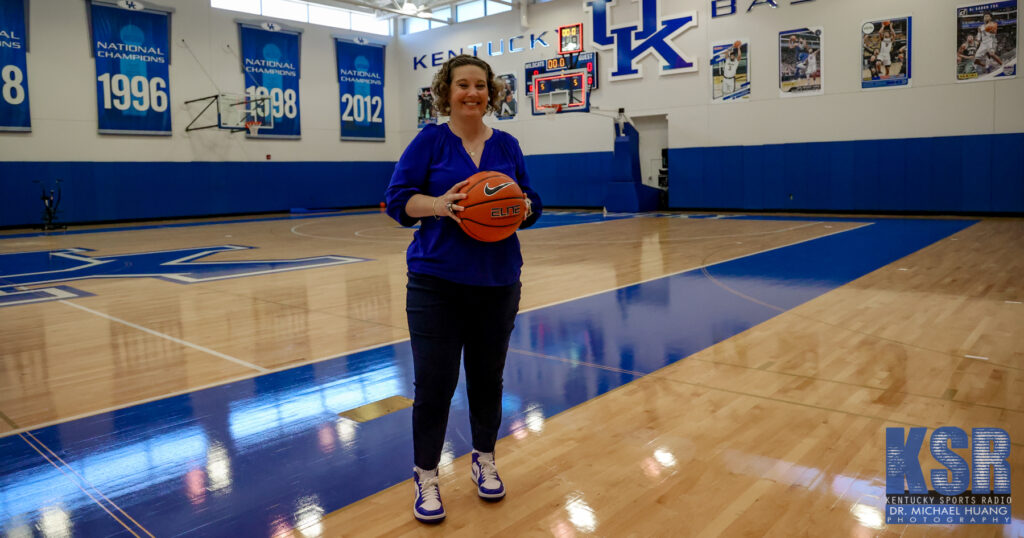
Sacrifices big and small
There is no “typical” day in a sports information director’s life. Some days you’re at Dillard’s helping players pick out suits. Others, you’re ushing them through the halls of an arena in Texas. On the best, you’re watching them celebrate wins and be celebrated at awards shows. On the most mundane (Sundays in the college football world), you’re behind the computer double-checking stats, putting together game notes, and submitting player-of-the-week nominations.
“I just love that it’s not a 9 [a.m.] to 5 [p.m.],” Slax said. “Every day is different. You travel the world. I did women’s basketball for almost eighteen years. I’ve been to different countries. I’ve been to almost every state. You can come and go in this job pretty much as you want. It’s just not work to me. It is long hours and it is a lot but it’s fun. It’s sports. It’s just my way of life.”
“I have a lot of respect for Susan and the job that she does because first of all, she’s a tireless worker,” Stoops said. “It’s one of those positions, it’s one of those jobs where at times it just doesn’t stop. I can relate to that. You just don’t know when things are going to come at you. She really works extremely hard, whether she’s on vacation or working or in the office or at home, sometimes her job never leaves her so she has to have the work ethic that she definitely has.”
Those long hours make a “normal” life “impossible,” Moore says, one reason she believes more women aren’t in the industry or don’t stay in it for long.
“I can’t imagine — I’m clearly not married and I don’t have kids — I can’t imagine what it would be like,” she said. “I didn’t even have a dog until my family moved here. My parents moved here and can help take care of the dog.”
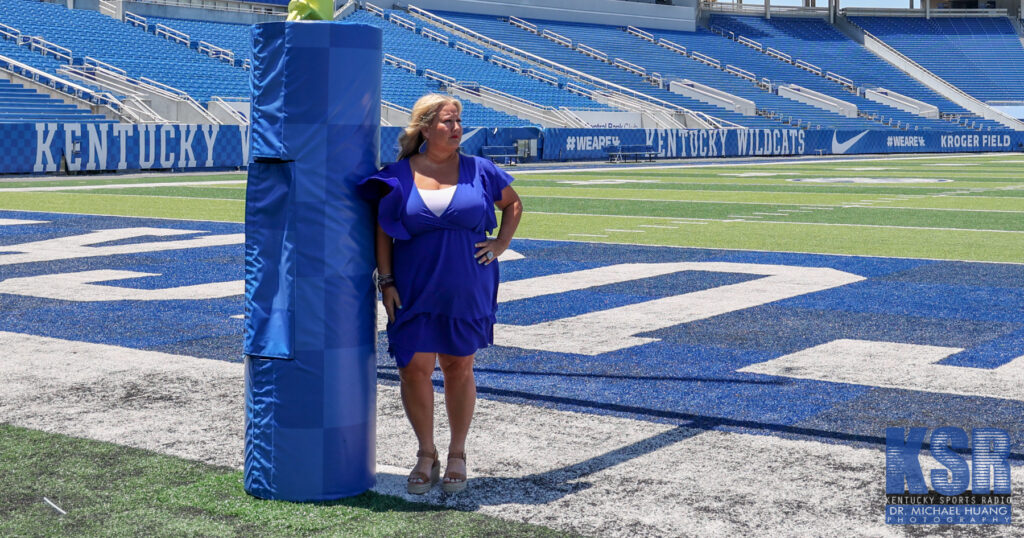
Also single with no kids, Slax is used to being asked about the “m-word,” marriage. Hilariously, Siri on her iPhone interrupted our conversation with the perfect response.
“Everybody’s like, ‘Why are you single?'” Slax said. “I haven’t found anybody that I wanted to marry –“
“I’m married to the idea of helping people,” Siri broke in.
“Thank you, honey,” Slax said, patting her phone. “Thank you.”
As someone on the road a lot himself, Tom Hart knows the sacrifices Moore and Slax make.
“To do the job well, you have to give all of your time to the program. Kentucky Basketball sports information does not take any breaks, whether it’s the expectations of the season, the drama of the season, the postseason, the draft, the fallout from the draft, recruiting, signing day, NIL, international trips. That is a 12-month-a-year job and when you’re working hand in hand with John Calipari, it’s a 25-hour-a-day job. He does not stop so those around him have to move with the same sort of attention to detail. That can be very taxing on a person’s free time and social life and just the mental break of leaving the job and turning the phone off, it doesn’t apply in that position.”
When Moore took over the role of primary men’s basketball SID following Lindsey’s departure in January, she really found out how demanding the role was. The entire UK Athletics staff pitched in to help her finish the season, running stats and organizing press conferences. Even the players offered to help.
“When she took on this position by herself, it was hard for her and we tried to make it not hard and I think we did a good job doing that,” Jacob Toppin said. “We love Deb and we appreciate what she does for us.”
“It was new to her,” Lance Ware said. “She was around but it was different. We definitely, the guys that have been here, definitely tried to help her as much as we could. If she ever needed anything, always would do it for her. Whatever she needed or however we could help, we could always do it.”
“It was a lot and Deb didn’t flinch,” Tony Neely recalled. “Whatever came along, we go the team effort going and got done whatever needed to get done. That was another thing that I felt good about in moving Deb into that spot because I knew it was going to be a very difficult two months to do that and she handled it well and that was again, another check mark as I was going through the process.”
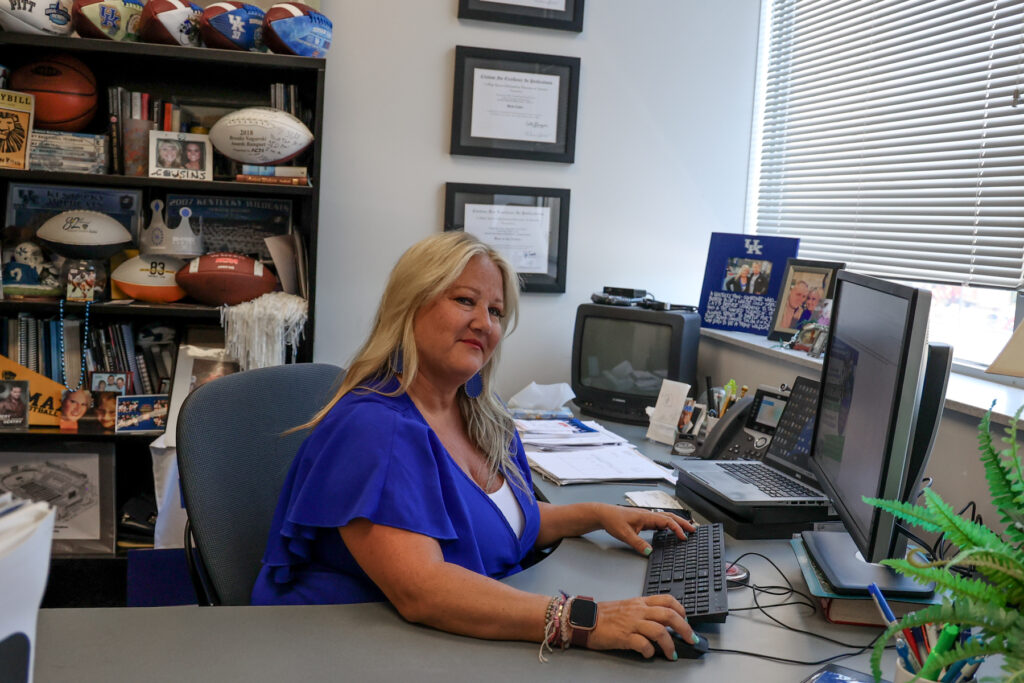
“I’ve never ever one time felt like I’m a woman doing a man’s job”
About a week before our conversation, the rarity of having women as the primary SIDs in men’s basketball and football struck Neely. Maybe it was the 50th anniversary of Title IX. Maybe it was the finality of having Deb firmly in her new role. (Or maybe, someone tipped him off about this story, this writer cynically wonders.) Either way, it was a revelation.
“The thing that I thought was neat about it when that crossed my mind is, that I really hadn’t thought about that because Susan does a good job of what she does and she’s the football SID. And I don’t think about her being a female as such. She’s just doing the job. Same thing with Deb.”
As we’ve covered, there are advantages and disadvantages to being a woman in sports media. For their part, Slax and Moore don’t think about their gender too much on the job.
“I’ve never ever one time felt like I’m a woman doing a man’s job,” Slax said. “Coach Stoops empowers me. I’m in the locker room. I’m never not invited to be anywhere in the building. I just feel like he will cuss me out just as well as he’ll cuss anyone out. I don’t feel like I’m not a part of things. He brings me in on the field just like he does anyone else.
“There’s not one coach — Hal Mumme, Guy Morris, Rich Brooks, Joker Phillips — not one coach here that has made me feel [like] ‘You’re a woman, you can’t be in here.’ I don’t know who a testament that is to.”
When I suggested it was a testament to her, she nodded.
“Maybe so.”
Moore hopes more women get into sports information. Not only does the industry need more voices at the table, it’s a way for former athletes to continue working in sports once their playing days are over.
“I think it’s important for particularly female athletes to see themselves in a career beyond their senior year of competing. We’re starting to gain traction with professional [women’s] sports in this country but sometimes you start retiring a little earlier when you’re a woman for various reasons. Being able to showcase there is an avenue in sports for them because they wouldn’t play sports if they don’t love it. Coaching’s obviously always been there but there should be other strong figures.”
“Women can do it. Don’t be scared of football,” Slax said. “Being a good leader is having people around you who know more than you in the areas you’re not comfortable in. It’s not a dealbreaker if you don’t know what a nickel package is.”
Slax recalled the popular stat from a Harvard Business Review study that men apply for a job when they only meet 60% of the qualifications, but women apply only if they meet 100% of them.
“We need to reverse that. A woman needs to say, I can do it. I can figure it out because they can in everything else in life.”
“You can’t do this job if you don’t love it. You just can’t.”
UK Athletics is in the process of hiring a secondary SID for men’s basketball to give Moore more time around the players. With the national player of the year Oscar Tshiebwe returning along with other core veterans and five-star freshmen Cason Wallace and Chris Livingston coming in, expectations remain sky-high for the program, especially after two disappointing postseasons. After a month with the team, Moore’s a big fan, particularly of their punctuality.
“Oh my goodness. People are going to love this group. First of all, they might be the collectively most responsible group we’ve ever had, which is a very welcome and exciting thing for someone who teaches punctuality and why that’s important. They’re incredibly responsible. There’s not necessarily a big personality which will be kind of cool because they all then fit together but I think they’re going to surprise you. They’re all tremendous and very sweet and caring guys and have a sparkle in their eyes to be there and are taking it all in.”
Moore and Kentucky’s video team just launched a new series entitled “For the Love of the Game” featuring the players talking about why they love basketball and the Kentucky experience. CJ Fredrick and Adou Thiero‘s videos are up now, with more to come from the rest of the team — including coaches. Moore hopes it will help fans reconnect with the program, as will John Calipari’s statewide autograph tour and the Bahamas trip. With big challenges ahead, she’s enjoying the moment.
“When I first got into the business, my No. 1 goal was always to work with a blue-blood basketball team,” she said. “I always wanted to be in big-time environments and have your game on TV every night and be what everyone cares about. For 10 years I did it in a secondary role and I’m kind of just enjoying right now being someone who can call the shots, but I’m not sure what it looks like beyond this because I kind of want to experience it first. I may hate it; I don’t think I will.”
“I’m very excited for her,” Isaac Humphries said. “I know how much goes into that role. I sat and watched Eric [Lindsey] hustle and do his thing alongside Deb but now it’s really cool to know Deb has those reins and she can make some more creative decisions because she’s really good at what she does. I think maybe she just needed a bit more freedom. Now that she has more freedom and some control, she can really do her thing. She’s got great ideas and I know from experience working so closely with her that she’s going to be great.”
Slax and Moore have both had opportunities outside of Kentucky, ones with higher salaries and more manageable hours. Both admit they’ve considered it. Yet, their love for the program, sports, and the players make all the sacrifices worthwhile.
“Being a part of this time and these kids’ growth is one of the reasons that keeps me coming back,” Moore said. “You can’t do this job if you don’t love it. You just can’t.”
“Recently I had [a job offer] that was like, ‘Whoa,'” Slax admitted. “But Kentucky made it where I wouldn’t want to leave. I felt wanted and appreciated and it reiterated my passion and love for this place and that’s what you want? You want to feel like you’re appreciated somewhere. And after 25 years of hard work and personal sacrifice, I feel like I’ve been valued here. I’m going to ride off into the sunset here at Kentucky.
“I know that there’s a reason I’m single and I don’t have kids. It’s because I’m making an impact in this way. With 130 football players every day. I’m just growing the group of people I’m impacting every year.”









Discuss This Article
Comments have moved.
Join the conversation and talk about this article and all things Kentucky Sports in the new KSR Message Board.
KSBoard